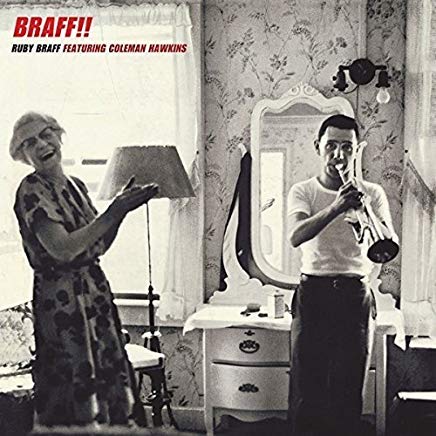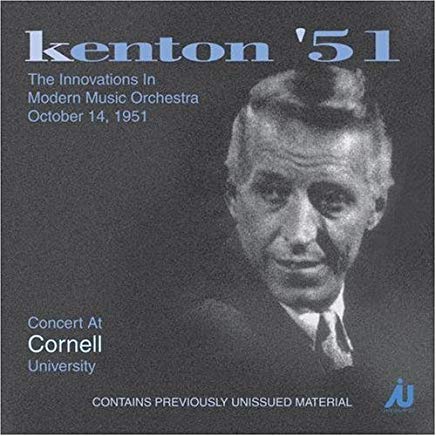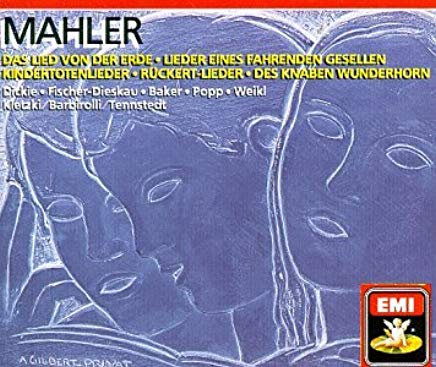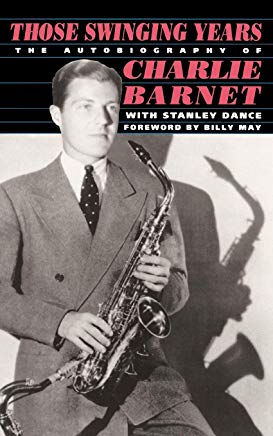-
Posts
13,205 -
Joined
-
Last visited
-
Donations
0.00 USD
Content Type
Profiles
Forums
Events
Blogs
Everything posted by Larry Kart
-
My Bruckner breakthrough continues with this, a great performance of what is commonly regarded as his greatest work -- i.e. Symphony No. 8. I have five recordings of this work -- Skrowaczewki's, this Horenstein, the old Vox Horenstein, Michael Geilen's, and Gunther Wand's Lubeck Cathedral live recording, and while the two Horensteins are similar in approach, the others couldn't be more different from Horenstein's BBC recording (haven't listened to his Vox 8th recently) or from each other.
-

What Classical Music Are You Listening To?
Larry Kart replied to StarThrower's topic in Classical Discussion
Don't have the box, but I do have on LP their three early Mozart quartets. Exceptional. -
After many years of respectfully (if that's the right word) trying to get into Bruckner at a (so to speak) gut level -- one where I really feel the "why" and "how" of his music without having to engage (or try to engage) in e.g. willful retention of themes over longer gaps in time than my memory can handle -- I finally got it, listening to Skrowaczewki's Saarbrucken Radio Symphony 7th (Oehms) twice in a row, the second time at a significantly higher (and for me just right) volume level than the first time. What I heard/what happened I don't quite have all the words for yet, but one thing I can say for sure -- the more sotto voce episodes (and there are some) blossomed like flowers, and once I inhaled their perfume, everything else began to fall into place; or rather, I began to feel where all the other places in the work are, why they are where they are, and why they are the ways that they are (notably, to my surprise, now nothing sounded bombastic), all this without engaging in games of thematic retention that are beyond my mental capacity.
-

Whole batch of Mosaic Selects and Singles running low
Larry Kart replied to miles65's topic in Mosaic and other box sets...
I love Ruby and Pee Wee in general but don't think "Hi-Fi Salute to Bunny" gets off the ground. The great Ruby mid-sized ensemble record from that time is "Braff!!" (Epic), the portion of that album with Coleman Hawkins, Lawrence Brown, Ernie Caceres et al. Indeed that whole album is solid gold, including the cover photo of Ruby with his mother. -
Excellent performances; the price is well nigh unbelievable. https://www.amazon.com/Beethoven-Piano-Sonatas-Bagatelles-9CD/dp/B0714GDHFM/ref=sr_1_1?crid=37JYKVJYANS4G&keywords=beethoven+kovacevich&qid=1563159800&s=music&sprefix=beethoven+kovace%2Caps%2C149&sr=1-1
-
-
Arno's warm-toned swinging style was instantly recognizable and very satisfying. I'm looking forward to the Mosaic Herman Mars set. R.I.P.
-

What Classical Music Are You Listening To?
Larry Kart replied to StarThrower's topic in Classical Discussion
Picked this up yesterday for a song at Half-Price, curious about the Fischer-Dieskau/Murray Dickie/Kletzki Das Lied. Never much of a F-D fan, in terms both of the voice per se and his interpretive style (all that lecture/demonstration underlining/barking for emphasis), but he's in mellifluous/passionate form on this 1959 recording, total unforced identification with the texts. Dickie is just fine, I very much like Kletzki's way with the score, and the Philharmonia is in superb form -- those horns and the winds! They play as if they've just encountered the work for the first time and are astonished by what they find there. The Baker/Barbirolli performances I already know, the Tennstedt Knaben Wunderhorn selection will be new to me when I get around to it. I like/imprinted on the old Wyn Morris Knaben Wunderhorn. -
Johnny "Guitar" Watson "Ruben"!!!
-
at Saturday's Sox-Cubs game: https://twitter.com/dawhite670/status/1147703487251263488/video/1?fbclid=IwAR3gVZ3SsN5g64lm1Dtbvm6b5b4iIQRDzdFX4x3sMSpTsg5UEDLH0cFg4Sw Stick around until they try to put cuffs on one combatant and she starts beating on the security guard. By most accounts these women were Cubs fans who were loaded before they got to the ballpark.
-

What Classical Music Are You Listening To?
Larry Kart replied to StarThrower's topic in Classical Discussion
Which somebody? -
Jerome, I believe, was pretty much a frontman/chameleon. A parallel from a bit later on might be trumpeter Larry Sonn, who "led" several swinging Coral big band albums in the '50s with the likes of Al Cohn and Phil Woods and then vanished into the woods, so to speak. Earlier on, Sonn IIRC led Latin-style bands in Mexico. https://musicians.allaboutjazz.com/larrysonn
-
As someone who has mixed feelings about latter-day Evans, I think he plays very well here, as does Toots.
-
One the book's mysteries (probably) solved. On p. 400 Miles refers to the "brilliant British composer Hernspach, who often wrote in minor modes." Almost certainly an error on the part of the inept transcriber of the interview, and an error that Troupe didn't catch, but who is "Hernspach"? Almost certainly, Miles was referring to the Swiss-American (not British) composer Ernest Bloch. Bloch was one of Gil Evans favorites; Gil even said that Schelomo was his favorite 20th Century work.
-
Denny is remembering musically what Miles in general and specific Miles or Miles-associated pieces (e.g. "Stablemates," "Dear Old Stockholm") meant to him. What's so hard to understand? BTW, Denny's take on "Stablemates" is from outer space.
-
A review I wrote of Arthur Rollini's autobiography, "Thirty Years with the Big Bands." {1987] Arthur Rollini’s name does not loom large in the history of jazz, even though he was the younger brother of a major artist (bass saxophonist and mallet percussionist Adrian Rollini) and a member of Benny Goodman’s saxophone section from the inception of Goodman’s band until 1939. But perhaps because of his cog-in-the-wheel status, Rollini has written a very moving autobiography , Thirty Years With the Big Bands --a book that captures the feel of the Swing Era from a sideman’s point of view with an attractive blend of stoicism and wit. Rollini’s tale also is suffused with a casual, peculiarly American grace, as though, like one of Sherwood Anderson’s narrators, the seeming innocence with which he addresses us were essential to his message. Rollini records that an early childhood memory was of “the brass and crystal Ansonia clock on our mantel, which never ceased functioning as long as it was wound every eighth day. It was always wound on time, and its little mercury pendulum kept beating back and forth and intrigued me. I would view it for hours.” Nothing more than nostalgia, one thinks, until, several pages and decade or so further on, Rollini’s father dies and “the only sound in the living room was the little clock on the mantel, which ticked away and gonged softly on the hour and half hour, its little pendulum still beating back and forth in perfect rhythm.” Following in his older brother’s footsteps, Rollini was a professional musician at age seventeen--traveling to London to work with Fred Elizade’s orchestra at the Savoy Hotel, where the Prince of Wales often sat in on drums. (“He was, let us put it this way, not too good,” Rollini says.) Jazz fans will be most interested in Rollini’s account of his time with Benny Goodman, which confirms the widely held belief that Goodman was a difficult man to get along with. “Inconsiderate Benny, the best jazz clarinetist in the world!”--Rollini uses that tag, and variations thereof, time after time, even when a harsher adjective than “inconsiderate” might apply. Rollini and Dick Clark were Goodman’s initial tenor saxophonists, and “even at this stage,” Rollini says, “Benny would look at Dick’s bald head with disdain. He wanted a youthful looking band. ‘Fickle Benny,’ I thought, ‘the best jazz clarinetist in the world!’ Dick was a good player.” Quietly authoritative, Rollini’s tales of the sideman’s happy-sad life have a cumulative power. And two of them, when placed side by side, virtually define the big-band musician’s paradoxical role. In the first, Rollini is playing a dance with Goodman when he meets an old high school friend, one Johnny Baker, who requests that the band play “Always,” on the recording of which Rollini had a solo. At the dance, Rollini deliberately plays “something entirely different from what was on our recording, and after it was over Johnny Baker said to me, ‘What did you change it for?’” Then, in the mid-1940s, when Rollini was an NBC Radio staff musician, he stops in a Manhattan bar after work and notices that “two young men were playing the jukebox and had selected Will Bradley’s ‘Request for a Rhumba,’ which we had recorded in 1941. Finally I stepped off the bar stool and asked, “Boys, why are you playing that record over and over?” One replied, “We like the tenor sax solo.” I felt elated, but did not tell them that it was I who played it.” Arthur Rollini died in 1993.
-
Exceptional
-

What Classical Music Are You Listening To?
Larry Kart replied to StarThrower's topic in Classical Discussion
The best I know of.
_forumlogo.png.a607ef20a6e0c299ab2aa6443aa1f32e.png)








